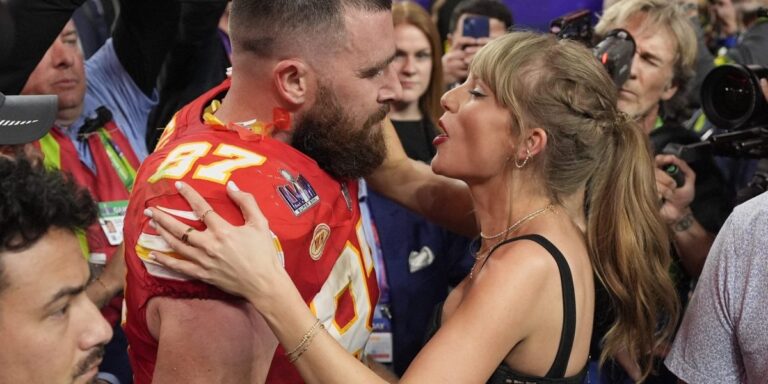
170-year-old rivalry flares as Kansas lawmakers try to take over the Super Bowl champion Kansas City Chiefs walk away from Missouri even though economists long ago concluded subsidizing pro sports it’s not worth the price.
Top leaders in the Kansas Legislature approved aid to professional baseball’s Kansas City Chiefs and Royals. finance new stadiums in Kansas ahead of a special session to be held Tuesday. The plan would authorize state bonds for stadium construction and pay them off with revenue from sports betting, the Kansas Lottery and additional taxes generated in and around the new venues.
The state line cuts through the metro area of about 2.3 million people, and teams would only travel about 25 miles west.
Decades of research have concluded that a professional sports franchise does not boost the local economy much, if at all, because it primarily captures existing spending from other locations in the same community. But for Kansas officials, the spending should at least leave Missouri and come to Kansas, and upper Missouri has its own appeal.
“I’ve wanted to see Chiefs in Kansas my whole life, but I hope we can do it in a way that enriches these communities, rather than creating additional burdens for them,” the state representative said Jason Probst, a Democrat. from central Kansas.
The rivalry between Kansas and Missouri dates back as far as the Civil War, before Kansas was even a state. The people of Missouri came from the east, hoping in vain to create another slave state like theirs. Both sides looted, burned and killed across the border.
There was also a century-long sports rivalry between the University of Kansas and the University of Missouri. And for years, both states have spent hundreds of millions of dollars luring businesses across the border in search of jobs. They called a uneasy truce in 2019.
Missouri officials are vowing to be just as aggressive in retaining the Royals and Chiefs, and not just because they view them as economic assets.
“They are a great source of pride,” said Missouri State Rep. John. Pattersona Republican from suburban Kansas City who is expected to be the next speaker of the House of Representatives.
Kansas lawmakers see Chiefs, Royals stake because Missouri voters refused in April to extend a local sales tax for the maintenance of their side-by-side stadiums. Lawmakers also argue that if no action is taken, one or both teams risk leaving the Kansas City area, although economists are skeptical that the threat is real.
With the stadium complex’s lease running through January 2031, Kansas officials say teams need to make decisions quickly to have new or renovated stadiums ready by then. They also promise the Chiefs a stadium with a dome or retractable roof that can host Super Bowls, college basketball Final Fours and huge indoor concerts.
“You have this asset and all the businesses that are moving there as a result, or being created there,” said Kansas state Rep. Sean Tarwater, a Republican from suburban Kansas City and the one of the leaders of the relocation effort. . “You will move commerce out of this area every day.”
About 60% of the region’s population lives in Missouri, but the Kansas region is growing faster.
Despite legislative efforts in Kansas, Missouri lawmakers are not rushing to propose alternatives. Missouri Republican Gov. Mike Parson told reporters Thursday that his state is “not going to just roll over” but also said, “We’re only in the first quarter” of the contest.
Both states have primary elections on August 3, with most legislative seats up for grabs this year. Missouri’s April vote on the local stadium tax suggested that subsidizing professional sports teams could be a political loser in that state, especially with the conservative-leaning electorate in the GOP primaries.
“In Missouri, the Republican Party was run by a business wing that might be friendly to this kind of thing, but in the Trump era, that’s not the case,” said David Kimball, of the University of Missouri. Missouri-St. Professor of political science Louis. “The more conservative the wing, the more Trump-oriented, they’re not big fans of spending taxpayer dollars on much of anything.”
Kansas Republicans are under pressure from the right to prevent the state from picking economic winners and losers. For Probst, the Democrat, the concern is using government “to enrich rich people,” meaning team owners.
Economists have studied professional sports teams and stadium subsidies since at least the 1980s. JC Bradbury, professor of economics and finance at Kennesaw State University in Georgia, said studies show that subsidizing sports stadiums is “a terrible channel for economic growth”.
While supporters of the Kansas effort cited a report indicating significant and positive economic implications, Bradbury said “fake” reporting is a vital part of stadium campaigns.
“Stadiums are a bad public investment, and I would say that’s a near-unanimous consensus,” said Bradbury, who has reviewed studies and done them himself.
Still, more than 30 lobbyists have signed on to lobby Kansas lawmakers for a stadium financing plan, and the CEO of the Kansas Chamber of Commerce called it a “unique opportunity” to attract the Chiefs.
The Chiefs have not only won three Super Bowl titles in five years, but they also have a particularly strong fan base that has grown thanks to tight end Travis Kelce. romance with a pop star Taylor Swift.
Host cities find the National Football League attractive because franchises are valued in the billions and wealthy owners and famous players get media attention, said Judith Grant Long, associate professor of sports management and urban planning at the University of Michigan and director of its sports venue center.
“All of these elements come together in a potent mix for politicians, civic leaders and local business interests who hope to capitalize on its influence,” she said.


